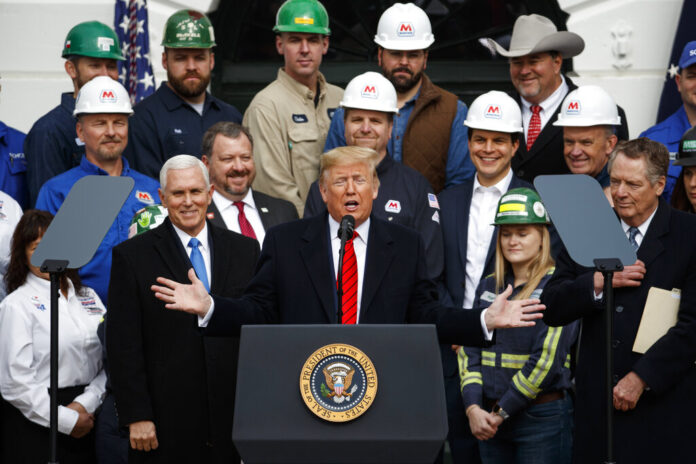President Donald Trump on Wednesday signed a new North American Free Trade Agreement, an update to the two-decade old pact that transformed the Rio Grande Valley economy.
Trump said renegotiating the North America Free Trade Agreement was “probably the No. 1 reason that I decided to lead this crazy life that I’m leading right now.”
“Today, we’re finally ending the NAFTA nightmare,” Trump said in a ceremony on the South Lawn.
The new trade deal, called the United States-Mexico-Canada Agreement, was welcome news to trade groups in South Texas, as well as lawmakers in the region. And after years of uncertainty for scores of companies that depend on the deal’s rules for business, one professor wrote that the trade industry will now be able to move forward.
“The USMCA will put an end to the uncertainty that has rattled the Mexican economy since Mr. Trump became the Republican presidential candidate in 2016,” Professor Jorge G. Castaneda, a specialist in Latin American affairs, wrote on Wednesday. President Sergio Contreras of the RGV Partnership and the Border Trade Alliance said the same of the South Texas economy.
Wednesday marked an end to a multi-year negotiation between the three countries, which came to an agreement in late 2018 during a signing ceremony in Argentina. But the U.S. Congress was not satisfied, and U.S. House Democrats negotiated with the Trump administration for months, culminating in the chamber approving the trade deal just before Christmas.
The White House event featured hundreds of business and farm leaders from around the country and scores of Republican officials. No Democratic members of Congress were on the White House guest list.
U.S. Rep. Vicente Gonzalez, D-McAllen, was one of the “yes” votes, despite hesitations about the security along Mexico’s popular trade corridors south of the Texas border.
“The USMCA provides certainty to families, farmers and businesses in the 15th District of Texas, but fails to address the growing insecurity that will continue hindering North American competitiveness absent concrete action,” Gonzalez said in a statement Wednesday. “I urge President Trump and Mexican President Lopez Obrador to prioritize the safety of thousands of people on both sides of the border and implement initiatives that make cross-border commerce and tourism more secure.”
In early January, U.S. Sen. John Cornyn, R-Texas, who also voted in favor of the new deal once it was passed out of the U.S. House, called the new deal “a good agreement. It is not a perfect agreement.”
“What the president will be signing is quite different from what the president sent us,” U.S. House Speaker Nancy Pelosi said on Wednesday ahead of Trump’s signing ceremony at the White House, where Texas Gov. Greg Abbott was in attendance.
Cornyn on Wednesday was complementary of the agreement.
“The USMCA will bring our trade relationships with Mexico and Canada into the 21st century, and Texas will see serious benefits,” Cornyn said in a statement. “From funding needed infrastructure to improving quality of life in border communities, this agreement is a win for the Lone Star State.”
Cornyn also pointed to a provision in the deal to bolster the North American Development Bank, which was created jointly by the U.S. and Mexico in 1993 aimed at preserving and improving environmental conditions and the quality of life for communities along the U.S.-Mexico border.
Cornyn and U.S. Rep. Henry Cuellar, D-Laredo, openly pushed for the provision, which includes $300 million in funding for the U.S. Environmental Protection Agency’s Border Water Infrastructure Program. It also includes a $215 million increase paid-in capital increase for the bank.
Trade experts say the impact of the new U.S.-Mexico-Canada Agreement will be modest. Canada and Mexico already represent the top two export markets for U.S. goods. The independent U.S. International Trade Commission last year calculated that the deal would add 0.35%, or $68 billion, to economic growth and generate 176,000 jobs over six years. That’s not much of a change for a $22 trillion economy with 152 million nonfarm jobs.
Contreras was hopeful that the new deal could provide an opportunity for the trade industry in South Texas.
“Where we should focus is being able to be a region where we can actually also produce, manufacture and service the commodities on the U.S. side as opposed to being a passed-through economy,” Contreras said.
Trump, following the signing ceremony, said the deal aligns with what he had called an “America first” approach during his presidential campaign in 2016. Trump trashed NAFTA during the campaign, and did so again on Wednesday.
“For the first time in American History,” Trump wrote on Twitter, “we have replaced a disastrous Trade Deal that REWARDED outsourcing with a truly FAIR and RECIPROCAL Trade Deal that will keep jobs, wealth and growth right here in AMERICA!”
The Associated Press contributed to this report.





